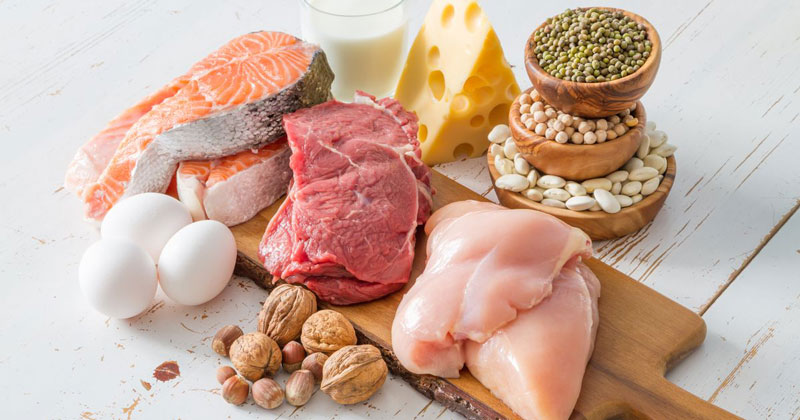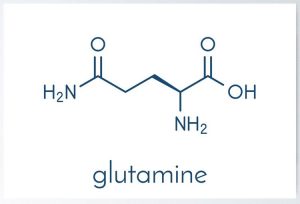Glutamine is the body’s most plentiful amino acid and is found in many animal products such as seafood, dairy, meat, eggs, and nuts. Glutamine comprises about five percent of all amino acids found in animal protein sources. Five percent may not seem like a significant amount; however, Glutamine is a critical component of a wide range of bodily functions.

When to take Glutamine
Contrary to popular belief, Glutamine is not an essential amino acid. It is categorized as “conditionally essential,” meaning under normal circumstances, your body can produce enough to function on its own. When your body is under extreme stress, however, your body may not provide enough Glutamine to meet its needs. During times when your body cannot produce optimal amounts of Glutamine, such as during injury, intense workouts, or severe illness, supplementing with Glutamine, may be beneficial for your immune health and recovery.
What is glutamine?
Glutamine is an amino acid and occurs in two different forms – L-glutamine and D-glutamine.
L-Glutamine
D-Glutamine
D-Glutamine is abundantly present throughout the body and is involved in many metabolic processes. It serves as the body’s principal nitrogen carrier and is an important energy source for many cells. The important form, L-glutamine, is produced in the body and found in many foods.
L-glutamine’s role is to convert amino acids into protein, which helps to fuel muscle growth. It is critical for maintaining the integrity of bodily tissues, making this supplement helpful for fitness and healthcare applications alike.
L-Glutamine helps regulate and produce energy, blood sugar, and immune function. Mineral absorption, neurotransmitter, hormone synthesis, and nerve cell protection are other biological processes in which L-glutamine assists.
What is glutamine?
Glutamine is an amino acid and occurs in two different forms – L-glutamine and D-glutamine. D-Glutamine is abundantly present throughout the body and is involved in many metabolic processes. It serves as the body’s principal nitrogen carrier and is an important energy source for many cells. The important form, L-glutamine, is produced in the body and found in many foods.
L-glutamine’s role is to convert amino acids into protein, which helps to fuel muscle growth. It is critical for maintaining the integrity of bodily tissues, making this supplement helpful for fitness and healthcare applications alike.
L-Glutamine helps regulate and produce energy, blood sugar, and immune function. Mineral absorption, neurotransmitter, hormone synthesis, and nerve cell protection are other biological processes in which L-glutamine assists.
Why take glutamine?
According to Texas A&M University, Glutamine deficiency can cause your body to be more susceptible to infectious diseases and can contribute to a higher risk for metabolic disorders.
 People who do not take in enough complete proteins because of their amount of exercise, their low-protein diet, or the elderly can be at risk for glutamine deficiency. Those suffering from kidney or liver disease may also be at risk, according to Translational Medicine of Aging.
People who do not take in enough complete proteins because of their amount of exercise, their low-protein diet, or the elderly can be at risk for glutamine deficiency. Those suffering from kidney or liver disease may also be at risk, according to Translational Medicine of Aging.
The most amino acids needed for optimal functioning of the human body are found in animal protein. For example, beef contains 63 to 68 percent protein, whereas vegetables only include around 12 percent.
Complete proteins are found in animal sources, but plant sources must be carefully combined to create a complete protein because most are deficient in amino acids.
If you are not consuming adequate protein, supplementing with L-glutamine may be a good option for you. L-glutamine can help you reach your health goals and can help your body produce more energy to fuel muscle growth, without storing it as fat.
Glutamine for muscle recovery
Glutamine is a staple for anyone who wants to maintain muscle mass during intense and frequent training. After intense exercise, glutamine levels in the body can reduce significantly.
During this state, muscle glutamine might be metabolized in order to supply the rest of the body, particularly cells in the immune system, with the Glutamine they need to function correctly.
Athletes and bodybuilders use L-glutamine supplements to put on muscle and lose fat. According to ISSA, L-glutamine and other amino acids work together to act as building blocks for connective tissues in skin and joints and are critical to supporting the body during training and exercise.
If you’re training for muscle and size and your glutamine levels are low, your body might be pushed into a catabolic state – where your muscle tissue is broken down. L-Glutamine reduces recovery time and allows your muscles to push a little harder than they would without it, helping to boost your strength and repair your muscles. Supplementing with L-Glutamine not only helps with muscle recovery but also helps to promote muscular growth. Because it is an amino acid, it also aids in increasing muscle strength.
WHEN TO TAKE GLUTAMINE FOR MUSCLE RECOVERY: For best results, it is recommended to take glutamine supplements right after you wake up and 30 minutes pre and post-workout, and right before bed. Glutamine has the best effect on your muscle mass and strength during these times. Be aware that taking Glutamine and creatine at the same time may affect how your body absorbs these supplements. Consider reducing glutamine intake when you wake up in the morning, and right before you go to bed – this will allow your growth hormone levels to rise more significantly overnight. Consistent supplementation can ensure that Glutamine, particularly L-glutamine, is maintained for optimum performance and muscle recovery.
Glutamine for weight loss
Glutamine helps maintain a healthy Body Mass Index (BMI) by reducing and eliminating food cravings and giving you a boost in energy. Your body requires extra Glutamine when you’re overweight, and if you do not have enough Glutamine in your system, the body is forced to break down muscle tissue to get the amino acids it needs to function. Having enough Glutamine in your body makes it easier to lose fat while preserving muscle mass.
A 2014 study published in the “European Journal of Clinical Nutrition” found that obese women who took glutamine supplements for four weeks lost weight even without changing their diet and exercise habits.
WHEN TO TAKE GLUTAMINE FOR WEIGHT LOSS: Taking Glutamine no more than 30 minutes post-workout aids in the production of natural human growth hormone (HGH) within the body. This is a huge advantage because high HGH levels translate into an increase in muscle tissue, a decrease in body fat, and a boost in metabolic activity. Those trying to lose weight will find this beneficial because high HGH levels suppress insulin production meaning sugar levels will remain stabilized throughout the day. Also consider adding glutamine-rich foods to your daily diet for best results.
Glutamine for leaky gut
Leaky gut syndrome, also known as increased intestinal permeability, is a relatively new diagnosis in the medical world. Leaky gut syndrome occurs when cracks or fissures develop in the inner lining of the intestines. These spaces allow bacteria to slip, or “leak”, from your gut and into your body. Leaky gut causes you to experience system-wide inflammation, abdominal pain, loss of appetite, fatigue, fever, and abdominal cramping.
Glutamine is a vital energy source for the cells found in the intestinal tract. It maintains the wall between the inside of the intestines and the rest of the body, thereby shielding against a leaky gut.
In addition, L-Glutamine works on a cellular level to repair the cracks or fissures that accompany leaky gut syndrome. Glutamine prevents harmful bacteria or toxins from moving from the intestines into the rest of the body. Glutamine is also essential for the healthy growth and preservation of intestinal cells.
 WHEN TO TAKE GLUTAMINE FOR LEAKY GUT: The perfect time to take a glutamine supplement for leaky gut is when your glutamine levels are at their lowest, like post-workout, on an empty stomach, and first thing in the morning. However, some people will also supplement during their workout, before bed, and in small doses throughout the day. L-glutamine supplements help to repair the gut’s mucosal lining and reduce intestinal inflammation. When battling a leaky gut, it is also crucial to incorporate glutamine-rich foods into your daily diet. Foods like meats, seafood, nuts, eggs, cabbage, beans, and whey protein are just a few options.
WHEN TO TAKE GLUTAMINE FOR LEAKY GUT: The perfect time to take a glutamine supplement for leaky gut is when your glutamine levels are at their lowest, like post-workout, on an empty stomach, and first thing in the morning. However, some people will also supplement during their workout, before bed, and in small doses throughout the day. L-glutamine supplements help to repair the gut’s mucosal lining and reduce intestinal inflammation. When battling a leaky gut, it is also crucial to incorporate glutamine-rich foods into your daily diet. Foods like meats, seafood, nuts, eggs, cabbage, beans, and whey protein are just a few options.
Top 3 Glutamine Products on Amazon
[amazon table=”4101″]
Glutamine daily dosage
On training days, it is recommended that you consume Glutamine prior to or during exercise to support hydration, electrolyte transport, and BCAA metabolism.
For those who train intensively, 20-30g of Glutamine per day should be sufficient, and 10g post-workout is often recommended. Bear in mind that some dietary sources (meats, dairy, eggs) also contain Glutamine so you’ll contribute to this through your regular diet too.
Unlike other supplements, there appears to be no need to cycle Glutamine. In fact, there’s evidence to support the need for chronic ingestion of Glutamine during periods of extreme physiological stress.
Therefore, it is important to sustain an increase in plasma glutamine concentrations even on non-training days. During these days, consume at least 5g of Glutamine every 2 to 3 hours.
Common supplements to take with glutamine
Given how stressful and intense physical training is on the human body, athletes and bodybuilders may experience benefits from supplementing with significant levels of Glutamine and from stacking it along with other supplements.
Consider taking Glutamine with sodium and electrolytes. Pairing the two may amplify cell volume, increase the absorption of electrolytes, and surge hydration. Cell water capacity is an element of muscle hypertrophy; consequently, Glutamine and electrolytes are the perfect combination for both endurance and bodybuilders. Significant decreases in cell water volume can also inhibit mTor signaling, which is critical for muscle building.
Consider stacking Glutamine with:
BCAAs: Mixing Glutamine and BCAAs can increase muscle mass and strength. Glutamine’s ammonia concentrations directly influence BCAA metabolism. Glutamine’s mTOR signals require the absorption of BCAAs, leucine especially. Pairing Glutamine with BCAAs is a perfect recipe for muscle gains and improved performance.
Glucose or N-Acetylglucosamine: If you are on a low-carb diet, you may experience Glucose deprivation, which can reduce glutamine uptake and negatively affect cell growth. Glycoprotein N-acetylglucosamine (NAG), may be able to restore glutamine uptake and metabolism, helping to boost recovery and cell function.
Citrulline: Pairing Glutamine with a citrulline supplement might increase citrulline’s ability to stimulate nitric oxide production, leading to improved oxygen and nutrient delivery to muscle. More oxygen and nutrients in the muscles may lead to better workout recovery and growth.
Alpha-Ketoglutarate (aKG): Similar to Glutamine, aKG supplements have been shown to slow down glutamine depletion and escalate the amount of mTOR pathways, as well as glutathione (a potent antioxidant). Glutamine taken alongside aKG may increase the likelihood of muscle gains.

In conclusion
Glutamine plays a key role in a whole host of bodily functions that impact your ability to achieve your health and fitness goals. If your body is not under extreme stress due to illness, intense physical exercise, or a protein-deficient diet, your body can most likely supply your body with all the Glutamine it needs. However, if you are training at a high-level and consistently putting your body in a stressed state, taking Glutamine in the right way, at the right time and stacked with the right supplements, can help you perform at an elite level. Be sure to talk to your physician before supplementing with Glutamine.

